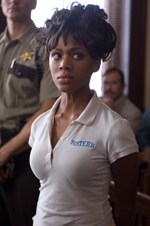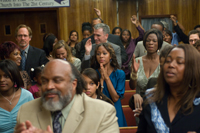In 2000, in the small Texas town of Hearne, Regina Kelly was arrested for selling drugs. A poor single mom with four young children, Kelly was one of many arrested that day who were innocent. But her innocence was inconsequential to the local district attorney, an official bent on carrying out the war on drugs with little regard for collateral damage.

Kelly faced intense pressure to plead guilty, but instead chose to fight the charges at great risk to her own well-being. American Violet, which opens in limited release this week, tells a harrowing story based on Kelly’s experience and that of others in her community. CT Movies recently talked with Kelly and the film’s writer, Bill Haney, about her decision to fight the charges, the sustaining power of faith, the legal changes her case sparked, and the ongoing war on drugs.
Regina, when you were arrested, the odds were stacked against you. You couldn’t afford an attorney and everyone—including your mom—advised it was in your best interest to plead guilty. Why did you choose to fight those charges?
Regina Kelly: The [drug task force] raids on our community had been going on for most of my life, and finally I got swept up in it. I just felt like I had to fight this because I knew I was innocent. And I had to prove to my kids that your freedom is worth standing up for.
While the movie focuses on my story, I’m not the only one who stood up. A lot of people stood up and said we’re not going to go through this anymore; we’re not going to take this. My mom only wanted me to plead because she knew the challenges I would be facing if I tried to go up against the DA. She was only trying to look out for my best interests. But after I explained what I’m going to do, she was like, “Okay, I trust you.”

The movie also touches on the support you got from a local pastor. What is your involvement with the church like?
Kelly: My faith was everything to me during this ordeal. And Reverend Ralph played a tremendous role in helping me along through my journey. He was always there and he helped me so much. He was someone I could talk to about my struggles who would listen and pray for me. His entire church took us in and it was like a big family. I couldn’t have asked for anything more.
Bill, how did you hear about Regina’s story?
Bill Haney: I was listening to the radio in rush hour traffic in Boston. Wade Goodwin from NPR had heard about Regina’s story, and I found that as I listened to this story about a young mother with four young children forced to choose between her principles and her family, I found myself starting to cry. I was so upset I couldn’t drive. I actually pulled over and called the ACLU who was then representing Regina and said I wanted to find out if there was some way I could help.
When the ACLU told me how many hundreds of thousands of Americans are going through the same sort of painful experience that Regina was going through—the long hideous arms of the war of drugs and the consequences on millions of Americans—I became determined to tell an authentic story about it. That began with working with Regina and her pastor and her mother, spending time in the project where she lived, and going through a series of cases that the ACLU and other nonprofits had been supporting. I tried to distill those stories in a way that met the confines of cinema, but was still rooted in the authentic experience of people like Regina. When the film opens, it will be roughly 6½ years since I began this project, and nine years since Regina was first arrested.
What inspires you about Regina’s story?
Haney: One is the bigger story—the 8 million Americans who are caught up in the criminal justice system, the 13 million Americans and their families who are convicted felons largely due to the misbegotten war on drugs—a war that Richard Nixon declared in 1971 when we had 200,000 people in prison. We now have 2.3 million people in prison. We’re the world’s largest holder of people in prison. We have 50 percent more people in prison than China and they have four times our population. So part of my emotional reaction to Regina’s story, frankly, is outrage.
But then there’s my reaction to the courage and character that Regina showed in risking her freedom to change the criminal justice system for all of us. I’m incredibly uplifted by her. I’m not interested in celebrities and movie stars; I’m interested in ordinary Americans who find the courage and character to do something extraordinary. Regina’s story inspired me to action and I hope American Violet will inspire others to action.

What was it like to be in this small Texas town, in this racially tense environment, where everyone on both sides are ostensibly good churchgoing folks? What was it like to find yourself in the middle of this?
Haney: It was fascinating. When I started work on this project I was finishing a film with a priest at the center of it. He was enduring death threats because of his efforts to improve human rights conditions for the poor. I was flying from that story in the Dominican Republic back and forth to Texas—and oddly enough, I felt more threatened in Texas. In the Dominican, the front page news said the sugar plantation owners wanted to kill the priest. But frankly, the conditions Regina and her community were living under felt much more intimidating because they were better masked as being somehow within the law.
As far as their particular, personal religious convictions, I can’t speak to those on the police force or the DA. The particularly repellent behavior on behalf of some, frankly both African-Americans and whites, is very hard to square with my understanding of Judeo-Christian principles. But that doesn’t mean they find it hard. I grew up at a Benedictine monastery, and my experiences with that religious order are still very important to me. They’re at the core of my values of social justice and the need for action on behalf of the least among us.
Kelly: The Christian community is totally divided in my town. It’s like our side is our side and their side is their side. Our churches are our churches and their churches are their churches. We never come together in our faith. But it’s like my mom always said, anyone can put on dress clothes and go to church. That doesn’t make you a Christian.
Your case was successful, but the DA remains in power in your small town. How is that possible?
Kelly: No one will run against him because they’re afraid of him, because he has so much power. It’s an elected position, but most people don’t vote.
Haney: A DA in a small Texas town is a king. In a community like Regina’s, that office has great power to control the lives of people. And when you have mandatory sentencing, it’s difficult for a judge to even question a decision by the DA. If the DA charges you, it’s pretty easy to get an indictment. So if a DA charges you and then offers you a chance to plea, the pressure to plea is awfully high. And once you’ve pled, the judge often has no choice in what happens. So the power of the local DA is unbelievable. There isn’t an apparent check and balance. And I think the fact that Regina’s DA is still in power suggests that the checks and balances in the U.S. constitution do not work in some of these places. [Robertson County D.A., John Paschall, told PBS’s FRONTLINE that he believes all of those arrested are guilty, but adds, “But I don’t believe the state had enough evidence to convict them beyond a reasonable doubt.” Kelly wants him to apologize for his actions, but he has not.]

Regina, I know you recently moved, but what was it like to continue living in your town for so many years after your case? Did you feel intimidated?
Kelly: Yes, all the time. When I got my own house in 2005, it was broken into three times and no police officer ever came out. And while my neighbors had utility bills around $200 to $300 a month, mine were routinely $1800 a month. No one could ever explain that to me. I wasn’t able to find work, and as my daughter got older she wasn’t able to get a job either because of me. I moved because it just got to the point where I had to quit putting my battles on my children and it was time to get away to live in peace.
What effect do you hope this movie will have in that town and beyond?
Haney: Regina’s story has already affected the town. Her story and the media have stopped the raids and forced the disbandment of the drug task force. I screened the movie for legislators in the Texas state house, and they are using it to push for new laws that will constrain the behavior of Das, put some checks and balances into the application of the drug laws, and give some authority to the judges.
We screened the movie in Regina’s town, and it led to a very active debate about how the people in her town feel about the DA. I guess our most optimistic notion is that many Americans will see this film and they’ll advocate for change, so that things like what happened to Regina won’t happen again.
Regina, how has this whole experience changed your life?
Kelly: I’m not so naïve anymore when it comes to public policy and the police and their rules and regulations. Before, I felt like, “If you don’t put yourself in that predicament, you won’t get in trouble.” A lot of people are like, “If it doesn’t happen to me, it’s not my business.” But this experience has opened my eyes. I’m much more aware of the plight of so many people who were swept up in situations like mine. This story isn’t just for me. This is for the millions of people who’ve gone through the same thing. I was just fortunate enough to get my story told.
For more on Regina Kelly, click here. For a list of theaters showing the film, click here.
Copyright © 2009 Christianity Today. Click for reprint information.












